Fantasia 2018, Day 20, Part 2: The Brink and The Outlaws
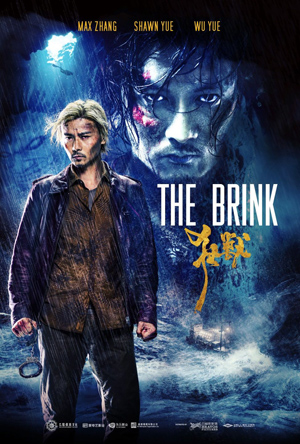 On Tuesday, July 31, the first movie I planned to see alongside a general audience was a Hong Kong action movie called The Brink. After that, I’d pass by the screening room before heading home. There’d be only two more days of Fantasia after this one, and I wanted to catch up on things I’d missed in theatres. I was specifically curious about a Korean movie called The Outlaws, about a cop who’s working against the clock to catch a Chinese gang who’re trying to take over territory in a district of Seoul. Two promising action movies; I had reasonable hopes for the afternoon.
On Tuesday, July 31, the first movie I planned to see alongside a general audience was a Hong Kong action movie called The Brink. After that, I’d pass by the screening room before heading home. There’d be only two more days of Fantasia after this one, and I wanted to catch up on things I’d missed in theatres. I was specifically curious about a Korean movie called The Outlaws, about a cop who’s working against the clock to catch a Chinese gang who’re trying to take over territory in a district of Seoul. Two promising action movies; I had reasonable hopes for the afternoon.
The Brink (Kuang shou, 狂獸) was directed by Jonathan Li, his first film, and written by Lee Chun-Fai. On the seas just outside Hong Kong, a gold smuggler named Jiang (Shawn Yue, Wu Kong) kills his superior and sets his sights on the big boss of the smuggling ring, a man named Blackie (Yasuaki Kurata, God of War) who rules a ship-board casino just outside Hong Kong waters. Meanwhile, an intense cop named Cheng (Max Zhang, Pacific Rim: Uprising) has set his sights on Jiang — who captures Cheng’s faithful partner A-de (Yue Wu, God of War) to get him to back off. Instead, the plot thickens, drawing Cheng’s boss (Gordon Lam) into the fray. A showdown at sea looms as a typhoon bears down on Hong Kong.
Depending on your tolerance for genre conventions, the movie’s story will seem either clichéd or an exercise in working with reliable tropes. Cheng’s a lone wolf who does things his way, while his boss yells at him to follow the rules. A-de has just one more day on the force. You can see that the whole story’s going to come down to a fight between Chang and Jiang.
Personally, I don’t mind clichés done well, with energy. I think The Brink’s hit-and-miss as far as that goes. The overall structure, establishing Cheng with a fight that goes wrong, then showing Jiang’s viciousness, and going on from there by moving back and forth between the two men — that works well, in theory. The conception of the characters, though, isn’t deep enough. You can’t have a chess-game of an action movie if the players are stereotypes. More effort was needed in imagining the leads.
On the other hand, the actors do their best to elevate the material, or at least make it new. Yue fares a little better than Zhang, probably because he has more to work with in the script. His Jiang’s a guy who came up from nothing through ruthlessness and a feral intelligence; now he sees his chance at a big score, and goes for it. Zhang, by contrast, is charismatic enough, and finds some interesting moments here and there, particularly with one of the few women in the film. Cheng unintentionally gets his partner killed in the movie’s first scene, then enters a kind of semi-paternal relationship with his dead partner’s daughter (Cecilia So); she’s underwritten, with an interesting subplot left underdeveloped, but she at least gives Cheng some desperately needed depth.
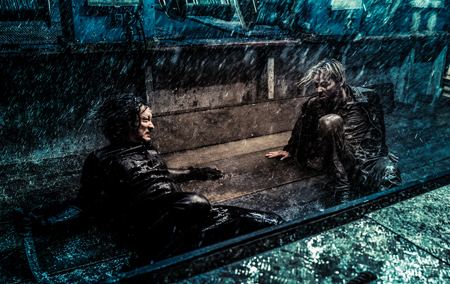 That lack of depth is a little frustrating, since to me the real problem with the film is that after some excellent action scenes in its first half it switches gears and slows down to the point that it seems to be trying to be a drama. And the characters just don’t have the depth to support that approach. As a cops-and-robbers action movie, The Brink is more than fine. As a film that tries to get us emotionally invested in the characters, it drags.
That lack of depth is a little frustrating, since to me the real problem with the film is that after some excellent action scenes in its first half it switches gears and slows down to the point that it seems to be trying to be a drama. And the characters just don’t have the depth to support that approach. As a cops-and-robbers action movie, The Brink is more than fine. As a film that tries to get us emotionally invested in the characters, it drags.
A solid concluding fight on a storm-tossed boat is strong, as is an earlier struggle underwater boasting some excellent photography. But the momentum’s been lost. The characters stopped doing interesting things for too long. The movie’s fallen between two stools, and it’s too late for it to find its feet again.
That’s a pity as The Brink is perfectly entertaining when it’s giving us action. It’s a technically strong movie, with well-choreographed fights (both one-on-one and mass brawls), and some strong visuals. A scene in a parking lot is a high point, as a prisoner exchange becomes a mad unpredictable scramble. A simple rule of thumb I have for action movies is that if I can tell how a fight or chase is going to end and the choreography’s just delaying the inevitable, it’s a bad scene; if the scene surprises me by ending up somewhere I didn’t expect, it’s a good bit that justifies being in the movie. The Brink justifies its action scenes. I just wish there were more of them.
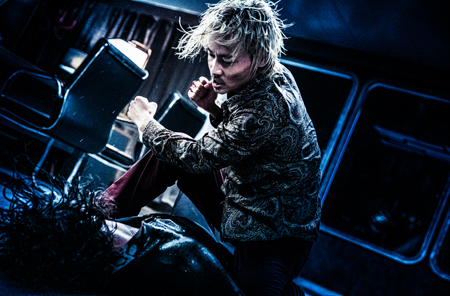 Visually, it’s always well-shot, with strong lighting work. The opening fight, when Cheng gets his partner killed, is more dramatic than the rest of the film — more shadowed, more colourful, and with more dramatic colour contrasts. Most other scenes seem dominated by the greyness of clouds and ocean. The film makes the most of these textures, but again there’s a sense that the eye-catching excitement of the first moments dwindle as things go on.
Visually, it’s always well-shot, with strong lighting work. The opening fight, when Cheng gets his partner killed, is more dramatic than the rest of the film — more shadowed, more colourful, and with more dramatic colour contrasts. Most other scenes seem dominated by the greyness of clouds and ocean. The film makes the most of these textures, but again there’s a sense that the eye-catching excitement of the first moments dwindle as things go on.
Overall, I felt the movie was unbalanced. Too much of the good action set-pieces happened too early. The movie sets itself up as a genre film, establishing an interest in strikingly-shot violence, and setting up characters with familiar backgrounds and little in the way of realistic everyday concerns. And then seems less and less interested in what it’s doing, instead trying to make the generic characters more rounded than they can really stand. The late return to action form feels unconvincing. The Brink is a well-put-together movie, with the ocean setting and the gold-smuggling plot genuinely interesting elements that make for some strong visuals. If it’s not committed enough to its action beats, the plot at least unfolds smoothly. But there’s too little here, and strong acting performances and a few good fight scenes are wasted on a story that’s not as involving as it needs to be. It’s almost a very good movie. But not quite.
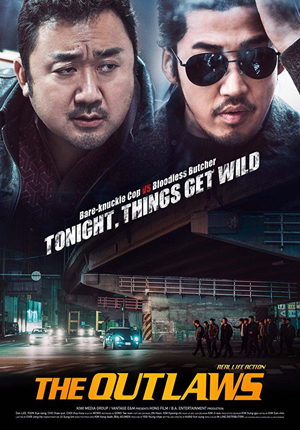 Leaving the De Sève theatre for the screening room (note therefore that what follows comes from watching on a monitor instead of the big screen), I sat down to watch The Outlaws (Beomjoidosi, 범죄도시). Inspector Ma of the Serious Crimes Unit (Dong-seok Ma, Train to Busan, Kundo: Age of the Rampant) works the Garibong neighbourhood of Seoul, a heavily-Chinese part of the city; Ma’s a big burly cop who’s good at violence in a rough-and-tumble way, able to literally slap a criminal silly. He’s on good terms with the gangs who run the area, maybe too good — he can step in when a turf war looms, but he indulges in some of the pleasures the gang bosses can provide. So it goes, until a Chinese gang, the Black Dragons, arrive and begin a takeover — and they have less scruples about violence than the locals. The movie quickly turns into a story about Ma trying to take down the Dragons as they exert more and more control over Garibong, while the psychopathic chief of the Dragons, Jang Chen (Kye-sang Yoon) goes from atrocity to atrocity.
Leaving the De Sève theatre for the screening room (note therefore that what follows comes from watching on a monitor instead of the big screen), I sat down to watch The Outlaws (Beomjoidosi, 범죄도시). Inspector Ma of the Serious Crimes Unit (Dong-seok Ma, Train to Busan, Kundo: Age of the Rampant) works the Garibong neighbourhood of Seoul, a heavily-Chinese part of the city; Ma’s a big burly cop who’s good at violence in a rough-and-tumble way, able to literally slap a criminal silly. He’s on good terms with the gangs who run the area, maybe too good — he can step in when a turf war looms, but he indulges in some of the pleasures the gang bosses can provide. So it goes, until a Chinese gang, the Black Dragons, arrive and begin a takeover — and they have less scruples about violence than the locals. The movie quickly turns into a story about Ma trying to take down the Dragons as they exert more and more control over Garibong, while the psychopathic chief of the Dragons, Jang Chen (Kye-sang Yoon) goes from atrocity to atrocity.
Written and directed by Yun-sung Kang, the movie’s based on a real incident from 2007. I can find little about the actual “Heuksapa incident,” though I note that residents of Garibong have expressed exasperation about having their neighbourhood presented as a home for criminals after a number of other films have done the same. (And the question of the representation of Chinese-Koreans in Korean film must await the attention of writers more knowedgeable than I.)
As a film, it’s carried by Dong-seok Ma. His Inspector is tough but good-natured, slightly corrupt but always looking out for the people he’s serving and protecting. He’s got a straight-faced humour to him, a blue-collar machismo. On the one hand, he never really seems that flustered or personally threatened by events in the film. On the other hand, he’s genuinely fun to watch nevertheless.
This more or less sums up the experience of the film as a whole. It’s pleasant, entertaining, and not especially daring. There is a fair amount of violence, the Black Dragons do present a very clear threat, and Jang Chen’s bloodlust is appropriately disturbing (Yoon, a former member of a boy band, apparently took on the role to change his image; I’d say he succeeded). But for all that, you never really doubt that things are going to end well. There’s the feel here of a modern-day TV cop show. There are baddies, there are sympathetic though not entirely flawless police officers, and the story is a working out of the process by which the latter bring the former to justice and restore order for the community.
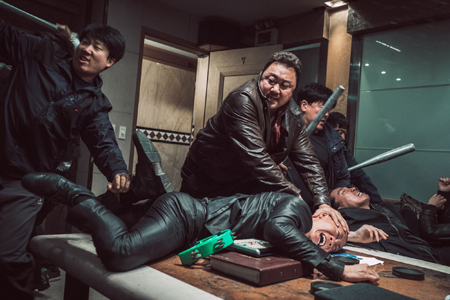 The police are rough-edged — an early scene shows that they have well-established tactics for beating the hell out of suspects without their higher-ups becoming any the wiser — but none of them are thoroughly corrupt. There’s something of a lack of tension among the police, then, even if one young cop has to learn how to toughen up. The personal lives are lacking definition; there’s no romantic sub-plot here, for better or worse, and so far as I can remember we never even see Inspector Ma’s home. He’s entirely a creature of his job.
The police are rough-edged — an early scene shows that they have well-established tactics for beating the hell out of suspects without their higher-ups becoming any the wiser — but none of them are thoroughly corrupt. There’s something of a lack of tension among the police, then, even if one young cop has to learn how to toughen up. The personal lives are lacking definition; there’s no romantic sub-plot here, for better or worse, and so far as I can remember we never even see Inspector Ma’s home. He’s entirely a creature of his job.
That’s a little odd, maybe, since otherwise the movie does a good job of establishing a visual identity for Garibong. This movie doesn’t look like other cinematic representations of Seoul that I’ve seen. Buildings are a little older, streets a little narrower. There’s a lived-in feel to the bars and markets that makes the place feel like a community.
Otherwise, though, the movie’s never especially striking in its imagery. There little in the way of particular visual interest (though note here the small screen might be a factor), and the pacing and editing don’t seem to add to the tension of any of the various confrontations. One scene, involving the Black Dragons in a video arcade, does land well, with gangsters confronting each other and dealing casual damage among dead machines with cracked screens. Otherwise The Outlaws feels like things you’ve seen elsewhere: cops searching through garbage for a dead body, gangsters threatening each other, cops hanging around their office, gangsters acting tough and mistreating women, cops going to a meeting with their supervisors, and so on and so forth. But for the most part the film tells its story clearly but unmemorably. If it is reminiscent of a TV show, in this it also inherited the virtue of a competent TV show: you always know what’s happening at any given moment.
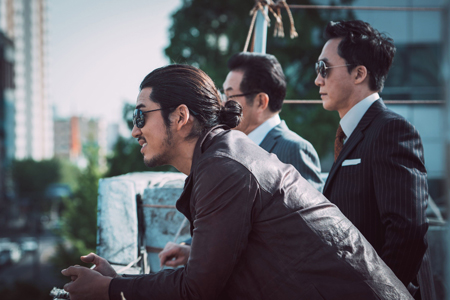 There is an odd feel here in that there’s a notable lack of gunplay. The violence is perhaps more brutal and personal as a result, and the choreography’s naturalistic; Inspector Ma bulls his way through trouble, he doesn’t do acrobatics. The point is that it’s a little difficult to understand how the local gangs maintained control for as long as they did without the willingness and ability to hurt people that the Black Dragons display. Sure, Inspector Ma’s kept the peace, but the locals clearly have violent guys in their organisations; yet the Dragons roll over them, and nobody stands up. Has Ma actually made it easier for the Dragons by taming the local gangs? The movie doesn’t suggest that, or seem to want to imply it, but it’s hard to come away with another impression.
There is an odd feel here in that there’s a notable lack of gunplay. The violence is perhaps more brutal and personal as a result, and the choreography’s naturalistic; Inspector Ma bulls his way through trouble, he doesn’t do acrobatics. The point is that it’s a little difficult to understand how the local gangs maintained control for as long as they did without the willingness and ability to hurt people that the Black Dragons display. Sure, Inspector Ma’s kept the peace, but the locals clearly have violent guys in their organisations; yet the Dragons roll over them, and nobody stands up. Has Ma actually made it easier for the Dragons by taming the local gangs? The movie doesn’t suggest that, or seem to want to imply it, but it’s hard to come away with another impression.
It’s hard for me also to see a central theme to the film. It’s a pair of contrasting character studies, in a sense, Ma against Jang Chen, but neither is developed as a rounded character; it’s a contrast of roles, then, of characters in specific positions set up to be in conflict. There isn’t a sense of an inevitable confrontation between the two men, and indeed the climax feels contrived, with obvious payoffs and obvious threats. Ma’s interested in taking down the Black Dragons as a whole, not Chen specifically. You can understand why. But it’s not always that easy to care.
So my day at Fantasia had ended with two crime movies. The Brink has better moments, The Outlaws is more consistent. I don’t know that there’s much to choose from between them in total quality, but they do different things well. I can’t say I had my hopes fully realised. But I also can’t say that I headed home tremendously disappointed. These are solid enough movies, just neither as good as they might have been. Some days are like that. And tomorrow, as it turned out, would be very different.
Find the rest of my Fantasia coverage here!
Matthew David Surridge is the author of “The Word of Azrael,” from Black Gate 14. You can buy his first collection of essays, looking at some fantasy novels of the twenty-first century, here. His second collection, looking at some fantasy from the twentieth century, is here. You can find him on Facebook, or follow his Twitter account, Fell_Gard.